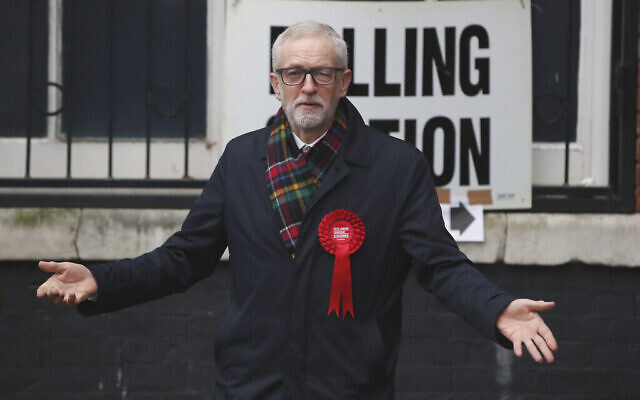Antisemitism became a problem for the nation
'A fundamental issue which Jeremy Corbyn’s successor must prioritise is how to tackle the antisemitism which he enabled since being elected leader in 2015'.

A UK Labour Party source put it succinctly: antisemitism was a problem in London at the beginning of the campaign – and then became a problem for the rest of the country. There lies one of the key explanations as to why the UK rejected Jeremy Corbyn – the unrelenting antisemitism which he enabled since being elected leader in 2015.
His worldview was underpinned by inability to distinguish between freedom of expression and giving licence to antisemitism to spread its pernicious message. A 53-page report by the Jewish Labour Movement claimed that Corbyn engaged in antisemitic conduct nine times, while also accusing him of permitting several thousand instances of antisemitic speech.
Among the incidents which were allowed to occur on his watch: He wrote a glowing foreword for a century-old book which includes antisemitic tropes – such as that journalism and banking are dominated by Jews. Imperialism: A Study, written by John Atkinson Hobson in 1902, claimed European finance was controlled by “men of a single and peculiar race”. Writing a foreword when the book was re-issued in 2011, Corbyn described the book as “brilliant”. He also wrote a letter of support for a vicar, Reverend Stephen Sizer, banned from social media after posting a link to an article blaming Israel for 9/11.
South Tottenham Labour officials sought to block membership applications from 25 Jews unless they were vetted through home visits, the report alleged; “this was not a requirement for other prospective members and appears to have been direct discrimination against Jewish applicants for membership.” In addition, this year’s party conference enacted controversial rule changes to its disciplinary procedures on a Saturday – precluding Jewish members from participating; and a vote of no-confidence in Jewish MP Louise Ellman was scheduled for the eve of the Day of Atonement – the holiest day on the Jewish calendar – and one of the factors which prompted her to quit the party after 55 years. Labour MP Stella Creasy tweeted that Ellman’s resignation “shames us all”.
The election was marked by the unprecedented intervention of the Chief Rabbi, Ephraim Mirvis, who urged Britons “to vote with their conscience … the soul of our nation is at stake.” Corbyn permitted a “poison sanctioned from the top” to fester, he charged. Labour’s leadership “never understood that their failure is … failure to see this as a human problem, rather than a political one. It is a failure of leadership. How complicit in prejudice would a leader of Her Majesty’s opposition have to be to be unfit for office? Would describing as ‘friends’ those who endorse the murder of Jews be enough? What will the result of this election say about the moral compass of our country?”
The Archbishop of Canterbury, the Muslim Council of Britain and Hindu leaders endorsed his concerns.
A survey by the Jewish Leadership Council of 12,147 people who voted Labour in 2017 but were uncertain about doing so this time asserted that antisemitism was almost as significant a reason as Brexit for abandoning the party – 16 compared to 19 per cent, while 26 per cent said accusations of antisemitism within Labour made them “embarrassed at the state of British politics” and 17 per cent “worried about increasing racism within the party”.
“The relief among the Jewish community is palpable,” wrote London’s Jewish Chronicle of the result. It’s not only the Jewish community which is relieved; it’s millions of voters who want a party that does not allow antisemitism. The size of the Jewish community is too insignificant to have determined this result. But revulsion of antisemitism played a significant part. So while the Labour Party is analysing where it went wrong, a fundamental issue which Jeremy Corbyn’s successor must prioritise is how to tackle the antisemitism which he enabled since being elected leader in 2015.
Vic Alhadeff is chief executive of the NSW Jewish Board of Deputies.

comments